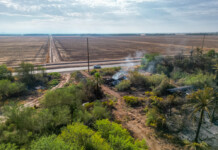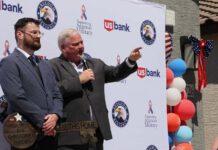
In four short months, some of the residents of Thunderbird Farms have organized themselves into a civic action group called the Thunderbird Arena Community Council to rehabilitate the old Thunderbird Arena. The arena is situated in the heart of the community on Ralston Road about a quarter-mile north of Papago Road.
TACC members held their first meeting in July and their first fundraiser, a community barbecue in August, netted more than $1,000.
In September, they held a second fundraiser, a pancake breakfast, at Raceway Bar & Grill on Papago Road and are currently preparing for status as a nonprofit organization.
For many years, the Thunderbird Farms area, located about a mile southwest of the city of Maricopa, has been thought of as an equestrian community with folks living a rural lifestyle on acreage running from 3.3 acres to 20 or more. When driving through the area, whether on Papago or Ralston Road, one can usually see horses grazing or romping in fenced pastures situated alongside rustic-style homes.
In the years prior to 2001, Maricopa, with a population of around 1,000, was considered a sleepy little farm town with an Amtrak railroad stop. Today, Maricopa is a bustling city of more than 40,000 that has sprawled within a mile of the rural community. While Maricopa has changed considerably, Thunderbird Farms has remained pretty much the same.
The only change one can perceive on the surface is the fact there aren’t as many horses as in the old days.
Longtime resident, horse enthusiast and TACC member Bobbie Johnson, for example, used to have 30 horses roaming in her pastures, but over just the past few years that number has been reduced to 13.
Unfortunately, the sorrowful condition of today’s economy has made horse ownership an expensive proposition. Not only has that caused some reductions in the area’s horse population, but it has also affected the physical status of Thunderbird Arena, which is still in use today.
Presently owned by Pinal County, it has suffered through some of the cutbacks the county has had to initiate to balance its fragile budget. The fence surrounding the 200 by 300-foot facility is in need of repair along with the light poles, which have been rendered useless by copper wire thieves. Even worse is the arena’s footing, the dirt floor, which has accumulated thousands of small rocks over its entire surface.
“The first thing that has to be done is to recondition the footing in the arena,” says TACC’s president, Chelli Sage. The work will require filtering out the rocks that have collected in the soil over the years and cutting down into the surface so that we can refill it with the proper material for the horses so the arena is safe for them.
“Filtering the stones out of the soil is very important, because those stones pose a danger to the horses’ feet, and this isn’t a permanent solution,” Sage says. “After the footing is seen to, we can work on the fencing in order to make the arena safe. Once the arena is safe, we can hold events there to raise money for all the other things that we want to do.”
Before July, there wasn’t an organization like TACC in place. It was just local residents who came to the arena a couple times a week to exercise their horses and teach their children to ride.
“It became kind of a social thing,” Sage says, “where we’d have a lot of fun, but it soon had taken on the shape of an informal meeting, where we’d chat about the poor condition of the arena and how it needed serious renovation and what we might be able to do about it.
“This arena has great potential, and the important thing to note is that Arizona is losing arenas all the time. The Gilbert Rodeo Grounds was closed down recently, mostly because of lack of funding for the upkeep and other things. We almost lost Horse Lover’s Park in Phoenix that’s owned by the city. They were going to close it down, because they didn’t have the funds to operate it, but a local saddle club there brought their community together to actually manage that arena, and now they’re managing it successfully.”
Johnson estimated it was more than 15 years ago when the Papago Buttes Riders helped build Thunderbird Arena. That group phased out and it was vacant for a couple years before the Thunderbird Fire District opened it again for equestrian events as fundraisers for the district — to put gas in the trucks and pay for the insurance.







![Maricopa’s ‘TikTok Rizz Party,’ explained One of several flyers for a "TikTok rizz party" is taped to a door in the Maricopa Business Center along Honeycutt Road on April 23, 2024. [Monica D. Spencer]](https://www.inmaricopa.com/wp-content/uploads/2024/04/spencer-042324-tiktok-rizz-party-flyer-web-218x150.jpg)



![City gave new manager big low-interest home loan City Manager Ben Bitter speaks during a Chamber of Commerce event at Global Water Resources on April 11, 2024. Bitter discussed the current state of economic development in Maricopa, as well as hinting at lowering property tax rates again. [Monica D. Spencer]](https://www.inmaricopa.com/wp-content/uploads/2024/04/spencer-041124-ben-bitter-chamber-property-taxes-web-218x150.jpg)




